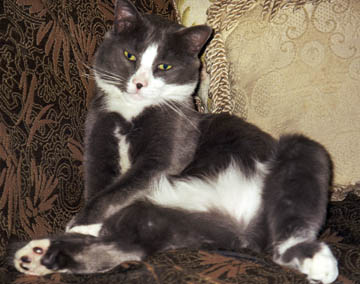Ayurvedic Pet Care
Because Ayurveda is a holistic system, many of the same principles used to maintain and treat human health can apply to animals as well. Cat and Dog FoodFeeding only dry food may result in dry flaky skin and dull fur (Vata provoking). Due to the lack of moisture, it may cause cystitis, stones and kidney disease (especially in cats). Dry food is void of Prana (life force); consider what the animal would eat in the wild. Artificial flavoring, preservatives and other chemicals in the food can lead to problems ranging from behavior changes to cancer. Corn, wheat, gluten, rice, soy and other fillers can provoke allergies. Just like in humans, the high amount of carbohydrates can also lead to diabetes and weight gain (Kapha provoking). A mono diet can also cause digestive problems. Commercial food containing "meat by-products" can make your pet sick. Those by-products are from diseased animals and waste that is considered unsafe for human consumption. Consumer laws do not protect against the use of such toxic products. Your pet can not fight against this but you can by boycotting them. Proper FeedingCainine and feline digestion is different from ours. Raw food is most easily digested and assimilated especially by dogs. Most cats will do alright with high quality commercial wet food. Buy brands such as "Wellness" or "California Natural" that are free of meat by-products, grain, soy, dairy or fillers. Even if quality food is slightly more expensive, this is not the place to skimp. You will make up for it with less frequent visits to the vet. Overeating creates health problems. Make sure the portion size is appropriate for your pet's size and leave at least 12 hours between feedings, especially for dogs. Don't feed table scraps (foods like salt, sugar, chocolate etc. are toxic). Food needs to be room temperature or lukewarm (avoid refrigerator-cold food). Cold food damages your animal's digestion. Rotate the source of protein (chicken, turkey, fish etc.) and avoid big animals like beef (what would your animal eat in the wild?). Fresh, filtered water should always be available. Your pet needs a calm, safe place where it can eat its regular meals uninterrupted (at the same time every day). SupplementsCats and dogs often nibble on grasses and herbs such as dandelion which helps the digestion and liver. If your pet does not have this opportunity or the environment is polluted, it is essential to provide them with greens. Nutritional Yeast for your cat (unless your pet is overweight), and green powders with spirulina and other green foods for canine/feline makes their fur healthy and shiny. Vegetarian Cat or Dog?Unfortunately your cat is not built to be a vegetarian; it requires high quality meat to stay healthy. Dogs can have a mixed diet with meat and vegetables. If you want to prepare food for your pet make sure you know about his/her nutritional requirements.General CareAnimals love affection and it is impotent to bond and reassure them every day, but don't let them sit on your pillow (they can carry parasites). Lack of natural sunlight can cause imbalances; make a sunny window accessible to your indoor cat. Give your pets plenty of play time and exercise. A fit animal lives a happier and longer life. Dogs are pack animals and need companionship. If your dog is alone all day, consider getting another animal or make arrangements with a human/canine friend. Keep your animals safe from household cleaners and other toxic chemicals. Some houseplants such as ferns and lilies are also toxic to pets. Be careful with pest control such as ant and rat baits and put them out of reach. Vet CareVaccinations are now recommended by most vets every year. However, these cocktails bombard your pet's immune system and can overwhelm it. Work with a vet that has a more holistic approach and also uses natural remedies. Indoor cats need less vaccinations because they have a lot less exposure to contagious diseases.
|
HerbsMany Ayurvedic and western herbs work well on animals. They also respond well to homeopathic and flower remedies. Most essential oils are toxic to cats because their livers cannot break them down properly. Flea ControlChemical flea treatments such as Frontline and Advantage are neurotoxins that can damage your pet's nervous system (despite assurances of their safety). Flea comb your pet every day and try neem products on its fur. Neem is very bitter; use diluted on your animal. Natural remedies are flea deterrents and need to be applied in small amounts every day.If you must have carpeting, vacuum every day and sprinkle neem powder. DewormingMix a small amount of Vidanga (for a 14 pound cat 1/4 of a teaspoon) into the wet food. Continue for one month. Skin ConditionsFor itchy skin and conditions like eczema, apply Neem and Aloe vera externally. Feed dandelion and squirt some calendula/burdock root tea in your pet's mouth. Arthritis and Joint ProblemsFeed dandelion and add turmeric and small amounts of boswellia into the wet food. Stress ReliefWhen traveling, moving or in other stressful situations give skullcap/oatstraw/chamomile tea. For trauma use Bach Flower "Rescue Remedy" (put a few drops into the water). Abdominal discomfortMassage the belly gently and give chamomile/ peppermint tea. Pet WashTry Aloe vera and calendula/chamomile/oat tea. Massage into fur and rub with a cloth. Pet ConsultationElke offers natural solutions for problems such as skin disorders, arthritis, immune disorders, diabetes and weight gain. Consultations include a health assessment, herbal remedies, diet advice and Acupressure/massage treatment/instructions. Please call Elke at Shakti Healing for more information 510-525-2956 or send a message. |
|
